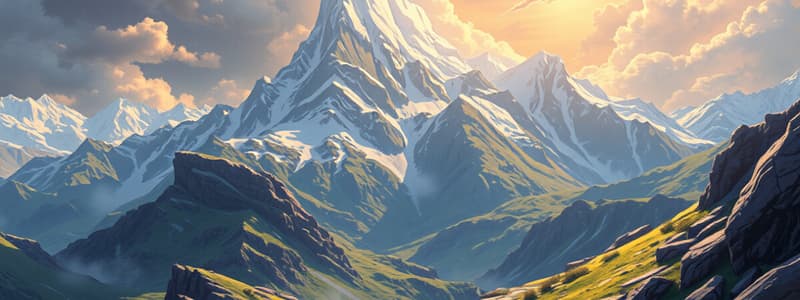Podcast
Questions and Answers
What does the process of erosion primarily involve?
What does the process of erosion primarily involve?
- The movement of Earth's tectonic plates.
- The breakdown of rocks into smaller particles.
- Wearing away of the Earth's surface by wind, water, and ice. (correct)
- The cycling of water through the atmosphere and land.
Which of the following best describes the focus of cultural geography?
Which of the following best describes the focus of cultural geography?
- The distribution and demographics of populations.
- The study of economic activities and industries.
- Cultural practices, languages, religions, and how they shape regions. (correct)
- The impact of physical features on political units.
What is a key focus of urban geography?
What is a key focus of urban geography?
- Environmental conservation practices.
- Study of cities, urbanization, and spatial organization. (correct)
- The distribution of economic resources.
- Analysis of political boundaries.
Which of the following components is NOT a key area of physical geography?
Which of the following components is NOT a key area of physical geography?
How does the hydrological cycle primarily affect the environment?
How does the hydrological cycle primarily affect the environment?
In the context of human geography, what does globalization refer to?
In the context of human geography, what does globalization refer to?
Which process leads to the transformation of rocks into sediments?
Which process leads to the transformation of rocks into sediments?
What phenomenon is associated with the increasing concentration of people living in urban areas?
What phenomenon is associated with the increasing concentration of people living in urban areas?
Flashcards are hidden until you start studying
Study Notes
Physical Geography
-
Definition: Study of the natural environment and physical features of the Earth.
-
Key Components:
- Landforms: Includes mountains, valleys, plateaus, and plains.
- Climate and Weather: Interaction between atmospheric conditions and geographical location.
- Soils: Types, formation, and distribution of soil across different regions.
- Water Bodies: Rivers, lakes, oceans, and their role in ecosystems.
- Ecosystems: Interactions between organisms and their physical environment.
-
Processes:
- Erosion: Wearing away of the Earth's surface by wind, water, and ice.
- Weathering: Breakdown of rocks into smaller particles.
- Plate Tectonics: Movement of Earth's plates causing earthquakes, mountains, and volcanic activity.
- Hydrological Cycle: Movement of water through the atmosphere, land, and bodies of water.
Human Geography
-
Definition: Study of human activities, societies, and their relationship with the environment.
-
Key Concepts:
- Population Geography: Distribution, density, and demographics of populations.
- Cultural Geography: Cultural practices, languages, religions, and how they shape regions.
- Economic Geography: Location and distribution of economic activities, industries, and resources.
- Urban Geography: Study of cities, urbanization, and spatial organization of urban areas.
- Political Geography: Analysis of political units, boundaries, and the impact of geography on politics.
-
Issues and Trends:
- Globalization: Increasing interconnectedness of economies and cultures.
- Migration: Patterns and effects of movement of people across regions.
- Sustainability: Balancing human needs with environmental conservation.
- Urbanization: Growth of urban areas and its social, economic, and environmental impacts.
Physical Geography
- Focuses on the natural environment and Earth's physical features.
- Landforms: Includes diverse formations such as mountains, valleys, plateaus, and plains influencing geography.
- Climate and Weather: Examines how atmospheric conditions interact with geographic locations, affecting weather patterns and climates.
- Soils: Studies various soil types, their formation processes, and distribution across different regions, impacting agriculture and ecosystems.
- Water Bodies: Analyzes rivers, lakes, and oceans, highlighting their ecological significance and influence on climate and human settlement.
- Ecosystems: Investigates the interactions between living organisms and their physical surroundings, essential for biodiversity.
- Erosion: Describes the gradual wearing away of the Earth's surface by natural forces like wind, water, and ice, shaping landscapes.
- Weathering: Details the processes that break down rocks into smaller particles, playing a crucial role in soil formation.
- Plate Tectonics: Explains the dynamics of Earth's plates, resulting in earthquakes, volcanic eruptions, and the formation of mountains.
- Hydrological Cycle: Outlines the continuous movement of water through the atmosphere, land, and water bodies, critical for sustaining life.
Human Geography
- Investigates human activities, societal structures, and their impacts on the environment.
- Population Geography: Analyzes the distribution, density, and demographic characteristics of populations worldwide.
- Cultural Geography: Studies the influence of cultural practices, languages, and religions on geographical regions and identities.
- Economic Geography: Examines the location and distribution of economic activities, industries, and natural resources influencing development.
- Urban Geography: Focuses on the growth and organization of urban areas, addressing issues related to urbanization and city planning.
- Political Geography: Analyzes political boundaries and the interplay between geographical factors and political decisions.
- Globalization: Highlights the increasing interdependence of economies and cultures worldwide, reshaping societies.
- Migration: Explores patterns and implications of human movement across regions, affecting demographics and economies.
- Sustainability: Emphasizes the need for balancing human development with environmental conservation for future generations.
- Urbanization: Studies the expanding urban areas and their socio-economic and environmental consequences on society.
Studying That Suits You
Use AI to generate personalized quizzes and flashcards to suit your learning preferences.




